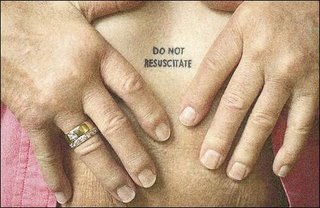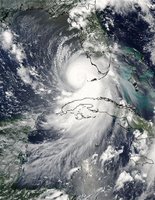Skidboot
| Anyone who reads this blog knows I go googly-eyed around good dogs. Hard to know which one of these two characters is more endearing. |
| Anyone who reads this blog knows I go googly-eyed around good dogs. Hard to know which one of these two characters is more endearing. |
| A healthy, active octogenarian has had the words "Do Not Resuscitate" tattooed on her chest. My favorite bit of this story: Her daughter, an Assistant Dean at a medical school, "failed to talk her mother out of getting the tattoo." "[Mom] said, 'Remember all those times when you were a teenager, and I said don't do this, that or the other thing? Paybacks are tough, aren't they?'"  Story and pic from Des Moines Register, with hat-tip to Miss Cellania. |
| Finally, the government has gotten something right. US Govt Bans Vegemite  .. |
For more on why Olberman is so exercised, here's a link to another video: a discussion with a professor of US constitutional law on the profound implications of the President's signing the Military Commissions Act into law. The most alarming thing in the latter video is the accurate read on America's collective yawn about its freedoms being signed away. As covered in this space previously, the passage of such laws is only made possible by Congress's assumption that the Supreme Court will eventually strike them down as unconstitutional. (Congress can pass laws that win political points unworried by their negative consequences if they have faith that the courts will invalidate them. This allows Congress to pander, while leaving the hard work of defending freedom to the judiciary. It's lazy and it's dangerous, as detailed in this article, "Pass the Buck", co-authored by my beloved Dahlia. It also violates elected officials' oath to protect and uphold the constitution. .. |
An issue like climate change (or global warming) is hard enough to get your head around without obfuscation. Turns out the Bush Jr White House has been trying to make it even harder. There is genuine debate, in the scientific community, about whether climate change is making hurricanes bigger, stronger and more damaging. The idea that global warming and hurricane damage could be tied together poses an uncomfortable question to the Bush Jr White House. If there's a potential link, then given the administration's failings in response to Katrina, and the ongoing economic cost of devastating hurricanes, why is the Bush Jr White House so inactive on climate crisis issues? There is genuine debate, in the scientific community, about whether climate change is making hurricanes bigger, stronger and more damaging. The idea that global warming and hurricane damage could be tied together poses an uncomfortable question to the Bush Jr White House. If there's a potential link, then given the administration's failings in response to Katrina, and the ongoing economic cost of devastating hurricanes, why is the Bush Jr White House so inactive on climate crisis issues?The Bush Jr White House reaction? Gag government scientists to keep them from speaking to the public. From Slate: Nature magazine recently reported that when a panel of NOAA scientists drafted a consensus statement on the issue suggesting that warming might be affecting hurricanes, administrators quashed it. The same story was also reported by the Associated Press (link goes to CBS news, which ran the AP story), and over at Salon.com, they found the evidence: e-mails from administration officials in the Department of Commerce, at the National Oceanic and Atmospheric Administration, and at the National Hurricane Center. If you were a government scientist whose research suggested a link between climate change and hurricanes, you weren't allowed to tell the public -- the same public that paid for the research via their taxes. .. |
| In his article "The Right Approach to Rough Treatment", from the National Journal, Jonathan Rauch writes in favor of using torture in some circumstances. His piece is so well reasoned and balanced in its articulation of the issue, I thought I'd link to it, here, to provide a counterpoint to my strident anti-torture stance. He doesn't come down in favor of the unlimited executive power ensconced in the Military Commissions Act; he makes a case for torture in extreme cases, but with complete transparency and accountability to Congress and to the American public. Coercive interrogation is a form of deliberate abuse that treats human beings not as ends in themselves but as means to an end. For a democracy founded on the promise of equal and unalienable human rights, there is no graver compromise. If the country needs to make this compromise—as I and, apparently, most Americans think it does—it needs to look its behavior squarely in the eye. In the end, I don't agree with his conclusion, but I wish there were more reasoned voices like his in the debate. Unfortunately, the first important round of the "debate", such as it was, is now over. Bush Jr signed the act into law this week. .. |
| Amsterdam is one of those cities in which it appears about half the people walking the streets must be getting paid by the tourist board to make the place look picturesque: old men with flowing white hair and tiny wire-rimmed spectacles; rosy-cheeked, young blonde mothers peddling bicycles with even blonder, rosier cheeked children balanced, singing, on handlebars; young couples hanging out the washing on the roofs of their houseboats. The very first time I visited Europe -- with my parents, when I was thirteen -- Amsterdam charmed me. This weekend was my first occasion back with time to wander, and the city swayed me even more. What was novel and beautiful to the thirteen year-old, seems now an almost impossible admixture of city-living on an intimate, unrushed, gentle human scale. It's just welcoming and gorgeous and full of people who live like they've got nothing to prove. As urban centers go, it's almost an idyll. Most life is probably lived in bland suburbs and office parks outside the center of the city. That is so often the case with historic European cities, the charm of whose old town centers necessarily fails to extend with modern sprawl. So long as one can sustain the fantasy of living along the canals of old Amterdam, however, thoughts of blandness are a world away. .. |
| I've been posting so damn much about US politics, here's a little anti-venom from the Brits, courtesy of ThePartyParty. .. |
| Had a bit of fun, the other day, reading a short NY Times article on the list of cases the US Supreme Court has declined to hear in its upcoming session. The full list of declined cases was 86 pages long, but the Times piece helpfully summarized. Two items stood out. First, it appears that, in Texas, while handguns are legal, weapons of mass orgasm will remain against the law. The court declined to hear a challenge brought by a worker at a pornographic bookstore in El Paso who was arrested for violating a state law against promoting sex toys shaped like sex organs. The employee called the law unconstitutional. Courts in three states have tossed out such laws, but Texas is one of three others where judges have upheld them. Second, it just tickles me that the following item came so close to making it onto the Supreme Court's docket. For my personal history with the defendants, click here. The former Kiss guitarist Vinnie Vincent lost a royalties battle against other members of the rock group. The justices will not consider lower court rulings that dismissed a claim by the plaintiff, whose real name is Vincent Cusano, that he was owed money for his contributions to the band’s album “Lick It Up.” Clearly, Scalia and the Black Robe 9 knew that Ace Frehley was the only KISS guitarist that ever mattered. I mean, come on: he was from space.  .. |
| I went on quite a bit, the other day, about Habeas Corpus, and why we should care that Bush Jr and the Republican-controlled congress have just stripped it from US law. The legislation they used to do it was called the Military Commissions Act. I might have saved my breath and just pointed you in the direction of the following two articles, both of which make the point far more clearly than I did. If you doubt whether, under the new law, you can actually be imprisoned without cause and imprisoned without end -- with torture, besides -- these articles make the answer plain: The Best for the Worst Pushing Back on Detainee Act, authored by human rights lawyer Michael Ratner. * * * In my last post I expressed doubts about the wisdom of some of Keith Olbermann's recent comments. Below, as counterpoint, is a wonderful, tongue-in-cheek Olbermann report on the implications of the Military Commissions Act for the US Constitution. Following that, have a look at the second clip: a YouTube video response to Olbermann's Habeas piece. If you think the average American isn't noticing what their country is becoming, this piece is reassuring. Let's just hope he's representative. .. |
| I have celebrated both the mouth and the guts of Keith Olbermann a few times here, recently. He's spoken elequently in closing editorials on his MSNBC program The Countdown, one of the only major media personalities to call the Bush administration out in the kind of frank terms that our spiral downward requires. I have no doubt that right-wingers decry Olbermann in the same terms that I would trash wing-nut partisan hack blowhards like Rush Limbaugh and Anne Coulter, but there are few Bush administration critics with either the platform or the skill of Olbermann. Recently, he's been using both. Which makes Jeff Cohen worried for him, as he details in his article "Is Olbermann on Thin Ice?". The only fear I really have for Keith is that his polemics have been getting increasingly personalized to Bush Jr. Edward R Murrow, Olbermann's journalistic hero, was at his best when he used a person's behaviour -- notably Joseph McCarthy's -- as the example of an evil, rather than naming the person's behaviour as the evil, itself. When Olbermann villainizes Bush the man, he provides a too-easy chicken exit, which is to debate Bush's personal words and behaviour, rather to engage with the ideology and policies Bush represents. Focusing on the wrongs, themselves, at the root of the entire administration's behaviour -- not restricting the attack to one bone-head -- but using the bone-head as the illustration, strikes me as more intellectually honest, and a more effective way of engaging a broader crowd in the debate. It is too easy to be dismissed as a simple Bush-basher, otherwise. In the end, however, this is a rhetorical choice, and perhaps a nuanced one. That choice makes the importance of Olbermann's voice on the air no less significant. Long may it rant. * * * Below is a recent Olbermann polemic: too personally villainizing for my tastes, even if I back the sentiment. .. |
| The Bush administration's stem cell research policy has always bothered me. There are a raft of reasons. The pragmatic one is that it prevents good science -- potentially life-saving science -- from getting done. But the larger reason is that it is both morally and logically hypocritical. The article "War and Embryos", by Michael Kinsley, nails why: life that motivates your political base appears to be the only life that's precious. Kinsley's take on "collateral damage" is bang on. .. |
With deference to Jimi H. "Hip hop music fans have more sex", from Scientific American. "Hip hop music fans have more sex", from Scientific American.Anyone like to join me for a little Snoop Dogg? |
| ...or, at least, as a political football. A fascinating analysis of where the abortion debate is, today. "Where the Rubber Meets Roe", from the Washington Post. .. |
| Perhaps the most articulate and credible critic of "the war on terror" is Richard Clarke, the former head of counter-terrorism at the United States' National Security Agency. He worked for Reagan, George Bush Sr, Clinton and then Bush Jr, after which the Bush Jr administration tried to discredit him because of his views on their failings in "the war on terror". In the article "Blinded by Hindsight", his prose is so measured, it's almost maddening. But it's also right. Everything I've ever read by him has held forth with with reason and level-headedness. Given what he's been through, professionally, I can't imagine maintaining anything like this level of reasonableness, as a critic. If you haven't seen the Clinton interview Clarke mentions in the article, I've linked to it, below. It's in two parts. .. |
| I referred obliquely to this analysis a few posts ago. I found it again at the bottom of my briefcase. "The Uses of Scare-Talk", from the Economist. The point of the article is that the more we rail about torture, the more we help George Bush. On "the war on terror", he's popular, and torture is, in the minds of the general public, all about "the war on terror". So, the more we talk about torture, the more we focus attention on an issue that helps Bush: terror. The politically astute response is not to talk about terror, but to talk about the war in Iraq, on which Bush is simply not credible in the eyes of most Americans. Yet, somehow, I can't bring myself to stay quiet about torture, about becoming a nation that actually sanctions torturing people with no recourse to the courts. .. |
| Finally, serious reporting of this unheralded epidemic: Cow abduction. (Mouse-over the grazing cow.) Hat-tip to Lawrence Wilkinson. .. |
| I have never read the work of Hannah Arendt, but this article at The Picket Line makes me want to. Quoting the article quoting Arendt: She was a refugee from, and a student of, a time and place in which: Quoting from later in the article, as the author reflects on the implications of Arendt: This love of truth and this need to live in harmony with yourself also seem so rare to me that the question of how to encourage them seems no easier than the question we started with — how to discourage people from participating in bureaucratic massacre and the like. How do you encourage people to love truth or to strive for integrity? .. |
| Last week, a scandal exploded in the face of US Replublicans when one of their Congressmen, Mark Foley (R-FL), was exposed as having sexually pursued a number of underage male congressional pages (ie, high-school-aged interns in congress). The e-mails and instant messages he sent them were so damning that he resigned immediately when they were revealed by a news organization. The scandal continued when it was further revealed that the Republican congressional leadership had known about Foley's "problem" for a long time and had done nothing about it. The Republican speaker of the House is now fighting to save his job. This from the "anti-gay Christian family values" party. All this comes just weeks before the entire House of Representatives is up for re-election. One Republican disgraced for pursuing underage boys is a problem, but an entire leadership morality scandal in the runup to an election is a huge problem. So, Fox news, always willing to lend a hand to Republicans in need, simply changed the story. No "shades of meaning" stuff, here. Fox's reporting simply labeled the disgraced Republican Foley as a Democrat. Not just on one broadcast, but several times.  Then, figuring they could help a little more, Fox later attributed the entire leadership scandal to the Democrats.  Anyone remember the tactics of the news organization in Orwell's 1984? Trying to see some humor in the whole thing, a couple of Boing Boing readers figured they'd save the Fox graphics department a little time, and they donated the following:   .. |
 The recent "detainee legislation" passed by the US government legalizes all the things you saw in the photos from Abu Ghraib. According to definitions in those laws, those things simply aren't torture, anymore. (Hat tip to Boing Boing for the graphic.) .. |
| On the phone, last night, Flame-Haired Angel asked me a question I've been trying to come to terms with, myself. If you visit here regularly, it's likely you've noticed, as she had, a decline in mirth, and an unusual current of fury. I haven't kept quiet how I feel about the paths the current US government is clearing into the future. Still, recent events have dominated my thoughts more than usual, and my reaction is beyond head-shaking. It is beyond indignation. It is fury, rage and not a little fear mixed with bitter sadness. The recent hit parade of US government assaults on freedom include warrantless wire-tapping of its citizens, the legalization of torture, the suspension of habeas corpus, and the granting of unprecedented authority to the President by stripping it from the courts. I know these sound like abstract things, far removed from your life. They aren't. They are the opposite of esoteric. They are the foundation of your life. They underpin your assumptions about everything. You assume that you must have done something wrong in order to be arrested. You assume that if a mistake is made, and you are wrongly arrested, it will eventually be addressed by the justice system. You assume that, while in prison for not doing anything wrong, you will be treated humanely. Laws passed in the last 10 days, by the Bush administration and a complicit congress, have made all of these assumptions wrong. For detail: The Blind Leading the Willing Photo Finish Habeas Corpus, R.I.P. The vilest of the assaults on our freedom is the deletion of habeas corpus. This hasn't gotten as much press as the fine points of torture. Understandably, most people see the term "habeas corpus" and tune out because it's Latin legalese. Don't. Habeas is the most basic right of an imprisoned citizen. It forces the government to either charge you with a crime or release you. When habeas is taken away, the government can imprison anyone they want to for as long as they want, without charging them. Laws pushed through the United States congress in the last two weeks delete habeas for anyone the US wants to imprison, unless they are a US citizen. Fancy a vacation in the US? For those of you who, knowing all this, still feel comfortable that *you* would never be detained, recognize that the US military and the CIA have released numerous prisoners who, they admit, never did anything wrong. They make no comment about the guilt or innocence of the prisoners they continue to hold. Only 10 prisoners at Camp X-Ray in Guantanamo Bay have ever been charged with anything. The CIA shipped a Canadian man to a secret prison in Syria. He was tortured for ten months. Never charged with anything. He turns out not even to have been worthy of suspicion, much less guilty of anything. Tortured for ten months. No reason to suspect him of anything. The law in civilized nations has always been pretty clear about this kind of thing. Since the Magna Carta in 1215. But not any more. The law just passed in the United States makes all of this perfectly okay. If you are kind enough to read my stuff, here, but don't zoom off to read the bleak-sounding articles I link to on topics like this, allow me to just briefly summarize what these new laws do:
I read the list above, and reminisce. It takes me back to highschool, reading George Orwell's 1984, straining for credulity. The publicity around the new laws strains to point out that the suspension of habeas corpus only applies to non-citizens. As a citizen, you can still be run through the ringer, as above, but you do at least have to be charged with something. That is, assuming the government doesn't just "disappear" you off to one of its foreign prisons, as it has done with several thousand people in recent years. Being a citizen doesn't buy you much these days, anyway. Two US citizens found that out recently when they tried to return to the US. They were stopped at the airport and prevented from boarding the plane home. The would continue to be barred from going home unless they submitted to an FBI interrogation under polygraph. Citizens not charged with any crime were barred from going home unless they submitted to questioning by government agents. All the talk of citizens and non-citizens, however, leaves me cold. It's okay to imprison them without trial, but not us? It's okay to torture them without evidence, but not us? What makes us different? Why does an innocent foreigner have fewer rights than a guilty American? And how do you know? By torturing them first? But the publicity about this citizen/non-citizen differentiation has been a palliative. In these new laws, the cancer on US Citizens is almost as bad. One article I read earlier in the week makes the connection clearly: ...the President [can] round-up both aliens and U.S. citizens he determines have given material support to terrorists. ... It is all of this that made Flame-Haired Angel ask the question. She has watched my mood turn with the same trend as the content of this blog. Why, she asked, after all the other malignancies this government has introduced on the notions of freedom and justice, should I be so exercised now? Aren't we beyond shock at what the Republican congress and President will do in the name of "the war on terror"? She's right that my reaction, now, is far more extreme than my plain opposition of the past. The Bush era has, in addition to incompetence (Katrina) and wishful thinking (greeted as liberators; insurgency in its last throes), delivered bad policy (invade Iraq), broken the law (wiretaps without warrants) and lied (Saddam's nuclear program). Throughout, I have been incensed over the work of a bunch of assholes who have kept themselves in power by feeding the citizenry fear and fabrication. What they have done in the last ten days, however, is far worse. They have offered us a new norm for what the United States stands for, and they have done it by making the illegal legal: by legislating exactly the kind of authoritarian blackness that characterizes totalitarian regimes. These are not simple changes in law. The rights they have ripped away are the foundations of a free society, without which there can be no democracy. They have, in short, started un-making the foundations of the longest-surviving democracy in history. For when freedom goes, so goes democracy. Because democracy isn't just about voting. Voting is predicated on a free society: free to think and speak and act in ways that the government of the day may not condone. Otherwise, voting -- something done in the former Soviet Union and in Communist China -- is meaningless. It is window dressing. I have always cleaved to the US Constitution. It is a nearly religious document to me. Its goals and its doctrine are radical: define a government by restricting its power to only that which the people allow it. These new laws tell you, as an individual, that you only have the rights the goverment allows you. They can legally throw you in prison, keep you there forever, and torture you. My lefty American friends tend to fall into one of two camps: those who think the US is becoming a police state, and those who think the Republic is essentially fine but just happens to be going through a period of being governed by a pack of whack jobs. Each thinks the other is a little pixelated. The first group calls the second camp "naive", and the latter folks call the former "alarmist". Normally, I side with the folks who say that assholes may be in charge, but the Republic has solid foundations. In the last week and a half, however, I've begun to change sides. That is why, as I told my Flame-Haired Angel, I am depressed. Only two things gives me hope. First, the majority of Americans are increasingly sceptical of the Republican administration's spin. They aren't yet rejecting it outright, unfortunately, but they also aren't so easily accepting the "just trust me" rhetoric of the President. The November elections are a test of what the American people want America to be. The second thing that gives me hope is that the Constitution is not arbitrated by the President or the congress, but by the Supreme Court. The process is slow, and the Court has a conservative majority, but challenges to the new laws will come and the Court does tend to take offence at attempts to strip judicial review, as some of these new laws do. So, the American people and the Supreme Court may prove my foul mood hasty. If they do, I will celebrate having been too knee-jerk, too melodramatic in fearing the un-making of American ideals. I will blissfully retract. It's an increasingly long road to get there, however: the un-Partriot Act repealed, torture abandoned, and habeas corpus applied to anyone we arrest. Until then, we will be listening to rhetoric about freedom in a land that isn't free. For under the law in today's "land of the free", freedom means imprisoning the innocent without charge and torturing them. Orwell's not straining for credibility anymore. .. |
I am posting the following piece in full because it calmly professes so much of what I am currently feeling not-so-calmly.
|
For a break from the news of torture and the suspension of habeas corpus and the child-molesting conservative Republican and the terrorist-strengthening war and warrantless wiretaps, and... You can go here and be inspired. You can go here and be inspired. TEDTalks It is the collected lectures at the exclusive Technology, Entertainment, Design (TED) conference. It's an extraodinary collection. No need for DVDs for me for a while. Watch an on-line stream, or even download all the audio and video. Just magic. |
This is old news, now, having been all over the net last week. Still worth posting, though: If you have a reaction to this -- especially an explanation for why it should be so -- I'd appreciate hearing about it, either in comments or by e-mail. Hat tip to Shannon. Original source is here: ThinkProgress.org |
| I'm running through a bunch of articles, tonight, that I'd printed out over the last week or so. Catching up on my reading, this time, feels like being repeatedly beaten over the head. Some of the articles are actually about that: beating people over the head. I don't feel I have the energy, just now, to do personal justice in prose to any of these topics, so I'll just pass a few of the articles along. They're all from Slate, and they cover what has recently been the unintentional running theme of this blog: the injustice of United States policy as set by the Bush administration with regard to civil liberties. Of the dozens of pieces read in the last little while, these few have really stuck out. Forget Nuremberg Tortured Logic Bad Party Line The Courtroom Slam Stream of Conscience ...no one can sue to enforce the protections of the Geneva Conventions or any other international protocol. And the detainees' first layer of appeal is not a standard military court—the United States Court of Appeals for the Armed Forces—but instead a panel hand-picked by Secretary of Defense Donald Rumsfeld. Last summer, even prosecutors complained that the Rumsfeld gang initially selected to try the detainees would ensure that convictions were upheld. And, yes, the pun in the title of this post is very deeply intended. .. |
| I finally saw pictures of Flame-Haired Angel's newly shorn head, today. Rather than post the pics, I'm gonna wait 'til she gets home and take some myself. It is remarkably Natalie Portman, though. She wasn't fibbing about that. .. |
| The link below will zoom you to an interesting analysis, from Slate, of why the best thing for either party, in the upcoming "mid-term elections" may be to lose. May the Best Man Lose For my non-American friends, the "mid-terms" are elections in which the Presidency isn't up for grabs, but the House of Representatives (the lower house) is, and so is one third of the Senate. The one thing the article ignores, however, is what I consider to be the biggest reason why Democrats can't afford to lose: They don't have a candidate who can win the next Presidential election, which is two years away. In my estimation, no-one can touch John McCain in 2008. So, unless we want another six years of imbalanced government, the Democrats better show well in November. .. |
| My moral outrage over the United States government's shameful attempts to legitimize torture only serves to help the Bush administration. Politically, it is to W's advantage that I focus my attention on the "war on terror", on which he's popular, and not on the war in Iraq, on which he's not. It's brilliant. I disagree with the war in Iraq, but I'm really pissed off by the thing he'd rather people were talking about. So, of course, because I'm pissed off, I can't help talking about it. Nevertheless, it is the thing that moves me from opinion to outrage. What kind of country are we that seeks to legitimize torture? The analysis in the article below is striking: Why do military lawyers, of all people, want the President to shut up about torture and back down? The answer offers a ray of hope, even if the political process does not. The article: "Cooler Heads", from Slate.  The illustration above is a totally irrelevant picture of hottie Catherine Bell, just because the article linked above is about military lawyers, and Bell just happened to play a military lawyer on the TV show, JAG. Hey, when you're wife's away and the country you always thought was a bastion of freedom tries to legislate torture, you gotta turn to some kind of solace. The illustration above is a totally irrelevant picture of hottie Catherine Bell, just because the article linked above is about military lawyers, and Bell just happened to play a military lawyer on the TV show, JAG. Hey, when you're wife's away and the country you always thought was a bastion of freedom tries to legislate torture, you gotta turn to some kind of solace... |